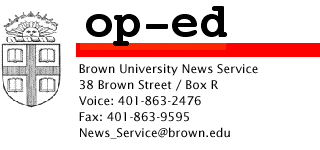Distributed July 2002
Copyright ©2002 by Lara Harb
Op-Ed Editor: Mark Nickel
About 520 Words
Lara Harb
Will education be the next security risk in the Occupied Territories?
The Israeli military raid on Al-Quds University in Jerusalem is ironic in light of the recent claim by the Israeli military that Palestinian textbooks incite students against the Israeli government. That claim, repeatedly debunked by U.S. academics, misses the point. The occupation – not to mention the ongoing attack on primary schools and universities – provides a far more provocative education than anything a textbook could ever convey.
The Israeli military raid on Al-Quds University in Jerusalem and the closure of the offices of the president, Sari Nusseibeh, a leading moderate among Palestinians, raise an important question: Will education be the next victim in the Occupied Territories?
As a Palestinian attending a U.S. university, I have the luxury of avoiding the obstacle course that my peers back home face every day. But increasingly, students in the Occupied Territories overcome the elaborate and often dangerous hurdles of curfews and checkpoints, armed settlers and teen soldiers, arbitrary detainment and random ID checks – only to arrive at a campus that is either closed, raided or without professors.
Even when given permission to move around, students face an uncertain voyage. In Hebron, the Israeli army lifted its curfew for a few hours to allow college students to go to campus. When students showed up at their assigned classrooms, however, Israeli troops surrounded the university and detained up to 300 of them. In another incident reported by the Israeli human rights organization B’Tselem, high school students were pulled out of their classes during the middle of their final exam and were forbidden to finish.
A common joke in the West Bank is that Palestinians have no rights except one: the right to be late, but these days there is only the right to stay put. My father, a medical professor at Al-Quds University, lives in Ramallah, which currently is under curfew. He has not been able to reach his classroom for three weeks. Like 700,000 other average Palestinian civilians in the West Bank, he sits under house arrest for no particular reason.
Many Palestinians are unable to apply to a university because restrictions on freedom of movement prevent them from taking the requisite national high school matriculation exams, the Palestinian equivalent of the SAT. Imagine the frustration. After years of preparation, you miss the chance to go to college because a soldier, probably still young enough to be wearing braces, decides to pull you out of line at a checkpoint.
The Al-Quds closure is particularly ironic in light of the recent claim by the Israeli military that Palestinian textbooks incite students against the Israeli government. Not only has this claim been repeatedly debunked by U.S. academics, most recently in an independent study conducted by George Washington University Professor Nathan Brown, but it also misses the point. The occupation, not to mention the ongoing attack on primary schools and universities, provides a far more provocative education than anything a textbook could ever convey.
The policy of targeting educational institutions is not new. During the first Intifada, Palestinian schools and universities were closed for more than a year. Last December, the Quaker high school I attended was added to the list of more than 90 schools which have been shelled by the Israeli military. Earlier this year, troops ransacked the Palestinian ministry of education, destroying computers and confiscating records.
Schools are not a security risk – quite to the contrary. Current repression of civil society – particularly students and educational institutions – is a counterproductive policy that will only squelch moderation while widening dissent.





